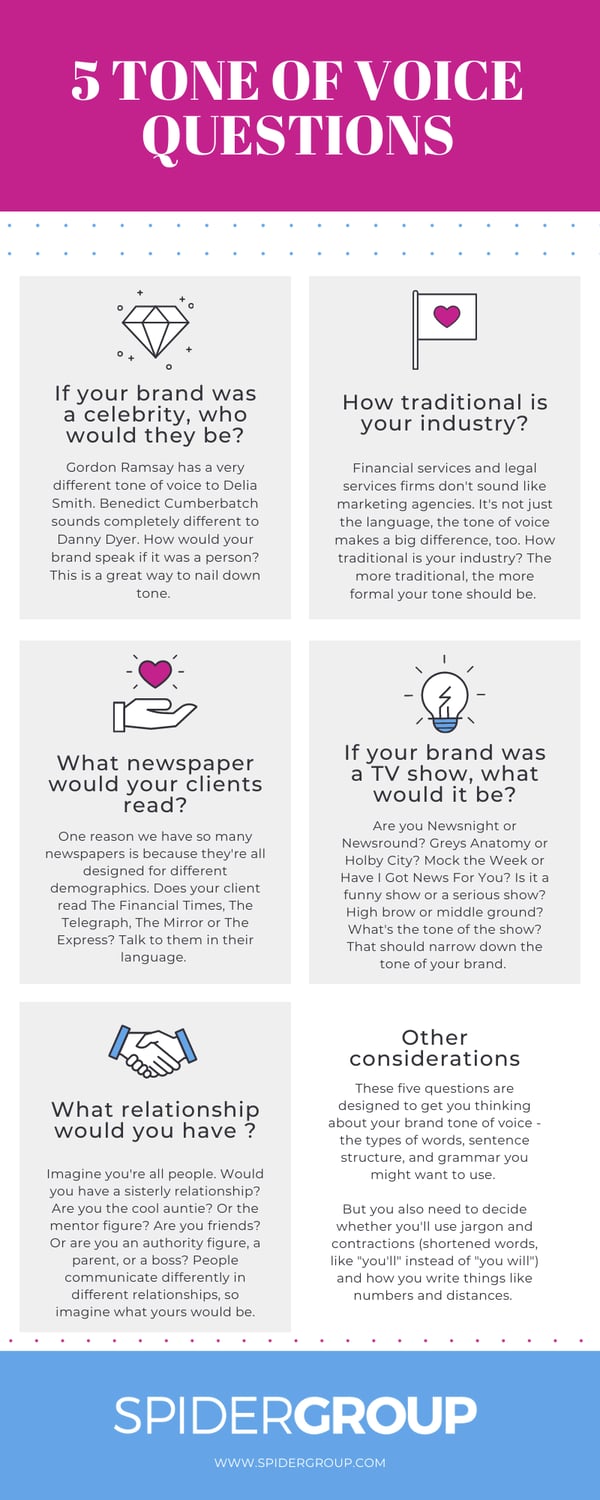Tone of voice - it's how your business sounds to people who come across your content. It means that you have a consistent style across different platforms and types of media, so that you always sound like you. It's part of your overall brand guidelines (brand is about more than just your logo and colours, after all).
No matter whether you're a small business, a sole trader, a start up, or a large enterprise, having a tone of voice is important. It's not just the realm of multi-national corporations.
But if you haven't already got an official tone of voice, how do you create one? How do you even know where to start? Well, it's simple - read this post!
How do you create a business tone of voice?
There are plenty of different ways to create a tone of voice, but there are some great questions to get you thinking about it - as you can see from the infographic below:

If your business were a celebrity, who would it be? This isn't about who you like, or if they look like you - it's about how they sound. What kind of language they use.
How traditional is your industry? Super traditional industries will almost always have a more formal tone of voice. And while you may want to break out of the tradition - particularly if you're a disruptor business - you still need to appeal to your target audience.
What newspapers would your clients read? This isn't just about the type of words a person uses, but also the writing style. Look at the sentence length - some newspapers will have long, flowing sentences, while others use lots of short, quick sentences.
If your brand were a TV show, what would it be? And this is about more than the type of show, like 'news' or 'comedy'. Look at the examples in the infographic - even shows within the same genre will be very different in terms of their tone and language.
And finally, what relationship would you have? If your brand is a trusted advisor, you'd generally be using slightly more formal language than your audience. If you're a friend, you'd match more closely. If your brand was a person, how would they interact with your customers?
Other questions to ask
How do you feel about swearing?
Most brands don't do it, because there's still a perception that businesses shouldn't. But then you get Dollar Shave Club and Thug Kitchen, who use swearing to great effect. It works for their brands, with the awareness that other people will be put off by it. Swearing is a risk, but if you're truly disruptive, maybe it's worth that risk (caveat here is that B2C and B2B are very different, and B2B is definitely less ok with swearing from a professional organisation).
How much jargon will you use, and how?
Generally, plain language is a better choice for communication and clarity, but that's not to say jargon doesn't have its place. Think about your audience first - do they use it? Do they understand it? Do they expect it? Ultimately, your tone of voice should be designed to be accessible to your audience while representing your brand, so think about your audience.
How will your tone change on different platforms?
Will you use exactly the same tone of voice on your website and on social media, or is there some softening on social platforms due to them being less formal modes of conversation? Some brands change their tone, others don't, so there's no right or wrong answer, you just need to make that decision so you know how to approach each.
Grammar - how prescriptive will you be?
Grammar is something that's not quite as hard and fast as some would have you believe. Sure, there are absolutely some rules that shouldn't be broken (it's 'should have' not 'should of', for example).
But there are other rules that may be relevant to highly formal written language but less so for communication. The sentence before this one starts with 'but' - that's something we were taught in school never to do, but people do it all the time when actually speaking. As our tone of voice is fairly conversational, that's a grammar rule that we're happy to break.
Will you use contractions?
Contractions are using "we're" instead of "we are", "you'll" instead of "you will", "that's" instead of "that is", and so on.
Again, they're more conversational in tone. If you want a formal tone, you wouldn't use them, whereas if you want to reduce formality, they're perfect.
As you can see, we use them all over the place. Just look at the previous paragraph as written without contractions: "Again, they are more conversational in tone. If you want a formal tone, you would not use them, whereas if you want to reduce formality, they are perfect."
It's subtle but it builds that sense of tone.
How does it all work?
Take a look at these answers:
- If our brand were a person, it would be: Stephen Fry
- If we were a TV show, we would be: MasterMind
- What newspapers do our clients read? The Times
- What relationship do we have with our clients? We're a trusted elder/mentor
- Do we use jargon? No
- Contractions? No
- Swearing? No
And compare them to these:
- If our brand were a person, it would be: Jason Statham
- If we were a TV show, we would be: Man Vs Wild
- What newspapers do our clients read? The Express
- What relationship do we have with our clients? We're a tough guy who backs them up in a fight
- Do we use jargon? No, but slang is ok
- Contractions? Exclusively
- Swearing? Occasional - for emphasis but not overused
You can imagine how different those brands sound, can't you? No matter what they're selling, we know they will sound different from one another (even if they're selling the same thing). And we know that their target market is different, because the type of people who will react well to example 1 won't connect with a brand that sounds like example 2, and vice versa.
What now?
So, you've answered all of these questions and now you have a pretty clear idea of what your business sounds like. Now what?
Well, you need to write it all down, as a formal "Tone of Voice Guidelines" document. If you only have it in your head (or scribbled in your notebook), no one else will be able to refer back to it, which means all your hard work won't lead to that consistency you're looking for.
As well as those elements, you also want to include your decisions on grammar, sentence length, jargon. Add in keywords like "conversational" or "authoritative".
Some useful things to include would be specific dos and don'ts, and comparison examples.
For example:
We would say: ''We'll help you work out what it is you need to do to help your business now and in the future'
We wouldn't say: 'It is important that you identify the elements that will help your business develop and progress into the future. Our business is able to support you in achieving that awareness.'
Our tone is straightforward, conversational, not especially formal (but still professional). We're a friend who knows a lot about something you want to know more about. We're approachable but expert. So the second sentence is not us - it's too wordy and not down to earth enough.
Examples make it easier for people to recognise what you mean.
Can your business tone of voice change?
This is a question that comes up, often when smaller businesses are concerned about being too prescriptive in their branding.
The answer is yes, as your business evolves, your tone of voice might well change. You might end up going after a different type of client, in which case your tone would evolve to resonate with them. You might change your company values and need to reflect that in your language choices. Or you might simply get larger and find that an irreverent tone of voice that suited you as a start up doesn't fit so well any more.
The main consideration is making sure your tone changes in line with your needs and your audience. And then documenting that change within your tone of voice guidelines and distributing those, with examples of what has changed, to your staff.


